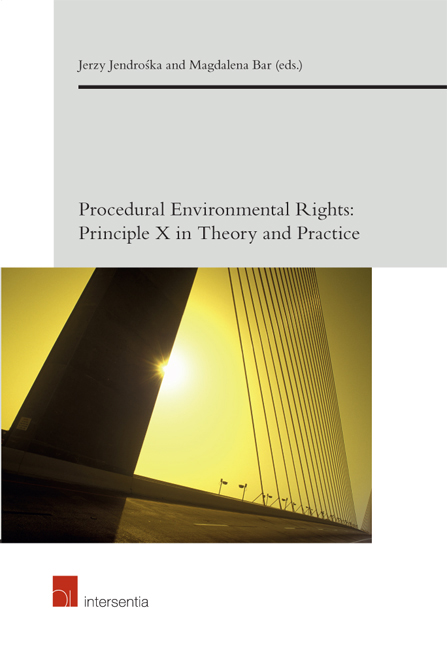Book contents
- Frontmatter
- Contents
- Introduction Procedural Environmental Rights in Theory and Practice
- Procedural Environmental Rights: Status and Developments
- Procedural Environmental Rights in Practice
- Public Participation
- Access to Justice
- Procedural Environmental Rights and Nature Protection
- Towards a Legally Enforceable Duty to Restore Endangered Species under EU Nature Conservation Law – On Wild Hamsters, the Rule of Law and Species Extinction
- Recognition of Rights of Nature, as a Subject of Law, in the International Environmental Law Framework
- Strengthening Conservation through Participation: Procedural Environmental Rights of Local Communities in Transboundary Protected Areas
- Procedural Environmental Rights and EIA
- Procedural Environmental Rights and Climate Change
Towards a Legally Enforceable Duty to Restore Endangered Species under EU Nature Conservation Law – On Wild Hamsters, the Rule of Law and Species Extinction
from Procedural Environmental Rights and Nature Protection
Published online by Cambridge University Press: 12 October 2018
- Frontmatter
- Contents
- Introduction Procedural Environmental Rights in Theory and Practice
- Procedural Environmental Rights: Status and Developments
- Procedural Environmental Rights in Practice
- Public Participation
- Access to Justice
- Procedural Environmental Rights and Nature Protection
- Towards a Legally Enforceable Duty to Restore Endangered Species under EU Nature Conservation Law – On Wild Hamsters, the Rule of Law and Species Extinction
- Recognition of Rights of Nature, as a Subject of Law, in the International Environmental Law Framework
- Strengthening Conservation through Participation: Procedural Environmental Rights of Local Communities in Transboundary Protected Areas
- Procedural Environmental Rights and EIA
- Procedural Environmental Rights and Climate Change
Summary
ABSTRACT
Over the past two decades ecological restoration has become a major environmental policy objective both at international and EU level. However, the question to what extent such restoration claims can be effectively enforced through legal action before national courts within the context of EU nature conservation law has received little attention so far. In this chapter a case is made for a legally enforceable restoration duty for strictly protected species, such as the Wild hamster, which are listed in Annex IV of the Habitats Directive. Taking into account recent case law developments before the Court of Justice of the EU (CJEU) it is argued that environmental NGOs might step in as effective ‘guardians’ of endangered species that are in dire need of additional recovery measures in order to stave offimminent extinction. It is demonstrated that the powerful combination of Article 9(3) of the Aarhus Convention and the general principles of EU law is capable of overcoming the traditional procedural obstacles to environmental litigation. Moreover, while the system of strict protection duties contained in Article 12(1) of the Habitats Directive is primarily directed at conserving the ‘status quo’, the restoration imperative present within the directive can still be used so as to compel Member States to adopt more progressive restoration strategies vis-a-vis protected species. The major conclusion is that it is no longer inconceivable to force national and/or regional authorities through court room action to implement more robust restoration programmes aimed at achieving the favourable conservation status of endangered Annex IV species.
GENERAL INTRODUCTION
FROM STATIC PRESERVATION MANAGEMENT TO ECOLOGICAL RESTORATION
‘Imagine a single survivor, a lonely fugitive at large on mainland Mauritius at the end of the seventeenth century. Imagine this fugitive as a female. She would have been bulky and flightless and befuddled – but resourceful enough to have escaped and endured when other birds didn't. Or else she was lucky. (…) (The dodo) had become rare unto death. But this one flesh-and-blood individual still lived.’
This compelling excerpt from the book The Song of the Dodo, written by David Quammen on the extinction of species in, to quote the author's own words, ‘a world that has been hacked to pieces’, aptly captures the unenviable fate of the last living survivor of a species that is on the road to extinction.
- Type
- Chapter
- Information
- Procedural Environmental RightsPrinciple X in Theory and Practice, pp. 287 - 340Publisher: IntersentiaPrint publication year: 2018



